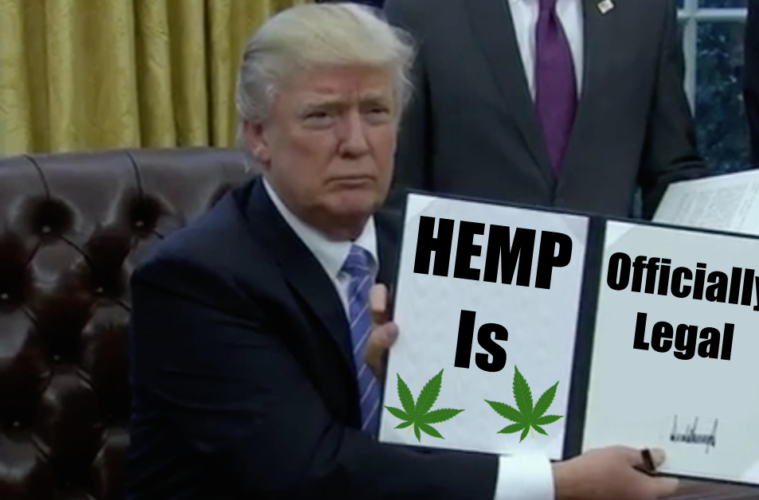The era of hemp prohibition is over. Hemp is now permanently removed from the Controlled Substances Act (CSA). It is forever deemed an agricultural commodity, no longer mistaken as a controlled substance, like marijuana.
Today, President Donald Trump signed the final version of the 2008 Farm bill. But this is not your normal farm bill. While it does provides important agricultural and nutritional policy extensions for five years, the most notable changes involve the cannabis plant. Normally, cannabis is not part of the conversation around farm subsidies, food stamps, and crop insurance. Yet, this year, Senate Majority Leader Mitch McConnell’s strong support of and leadership on the issue of hemp has blasted the cannabis plant into the limelight.
let’s bring you up to speed, hemp is defined in the legislation as the cannabis plant (yes, the same one that produces marijuana) with one key difference: hemp cannot contain more than 0.3 percent of THC (the compound in the plant most commonly associated with getting a person high). Basically, hemp can’t get you high. For decades, federal law did not differentiate hemp from other cannabis plants, all of which were effectively made illegal in 1937 under the Marihuana Tax Stamp Act and formally made illegal in 1970 under the Controlled Substances Act—the latter banned cannabis of any kind.
It’s true that hemp policy in the United States has been drastically transformed by this new legislation. However, there remain some misconceptions about what, exactly, this policy change does.
The 807-page document is nearly half a foot tall. Hemp is discussed in only a handful of pages. But the impact on the industry is monumental:
What will the new law do?
- Redefines Hemp to include its “extracts, cannabinoids and derivatives,” Congress explicitly has removed popular hemp products — such as hemp-derived cannabidiol (CBD) — from the purview of the CSA. Accordingly, the Drug Enforcement Administration no longer has any possible claim to interfere with the interstate commerce of hemp products. This should give comfort to federally regulated institutions — banks, merchant services, credit card companies, e-commerce sites
and advertising platforms — to conduct commerce with the hemp and hemp product industry. - Hemp farmers now may finally access needed crop insurance and can fully participate in USDA programs for certification and competitive grants.
- State and local governments may impose separate restrictions or requirements on hemp growth and the sale of hemp products – however, they cannot interfere with the interstate transport of hemp or hemp products. We are hopeful that local and state officials will follow Congress’ lead, as well as the statements and resolutions of the World Health Organization and the U.S. Food and Drug Administration (FDA) that declare, after intense scientific scrutiny, that CBD is safe, non-toxic, and non-addictive.
- The FDA continues to exercise jurisdiction over the regulation of ingestible and topical hemp products. We applaud the agency’s continued efforts to crack down on bad actors who undermine the industry through misguided marketing claims. And while we are concerned about non-binding statements made by the FDA that have led some state and local officials to question the legality of the retail sale of hemp-derived CBD, we are hopeful that we can work with the agency to clarify that CBD – which their own scientists concluded has no abuse potential and does not pose a risk to public health – should not be withheld from Americans who count on it for their health and wellness.
For a more detailed report over the new law check out US Hemp Roundtable’s General Counsel Jonathan Miller’s expert summary on what the Farm Bill does and means for the hemp industry.
oday at

